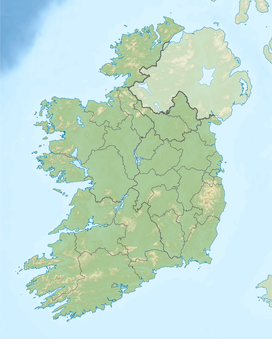| Little Sugar Loaf | |
|---|---|
 Little Sugar Loaf, from the east | |
| Highest point | |
| Elevation | 342 m (1,122 ft)[1] |
| Prominence | 247 m (810 ft)[1] |
| Listing | Marilyn |
| Coordinates | 53°10′8″N 6°7′12″W / 53.16889°N 6.12000°W |
| Naming | |
| Native name | Giolspar |
| English translation | Giltspur |
| Geography | |
| Location | County Wicklow, Ireland |
| Parent range | Wicklow Mountains |
| OSI/OSNI grid | O2606514480 |
| Topo map | OSi Discovery 56 |
| Geology | |
| Mountain type | Quartzite Bedrock[1] |
Little Sugar Loaf (Irish: Giolspar, meaning 'Giltspur')[2] is a 342 metres (1,122 ft) hill in the far northeastern sector of the Wicklow Mountains in Ireland. It does not have the elevation to rank on Arderin, Hewitt, or Vandeleur-Lynam scales,[3][4][5] however, its prominence of 247 metres (810 ft) ranks it as a Marilyn.[6]
The Little Sugar Loaf is situated northeastwards from the Great Sugar Loaf, but separated by the N11 dual carriageway. The northern side of Little Sugar Loaf directly overlooks the town of Bray; the eastern side (see photo) looks across the R761 between Bray and Greystones to the western slope of Bray Head. Little Sugar Loaf has a distinctive profile of a rocky double summit.[7] Like the Great Sugar Loaf, it consists of Cambrian Period quartzite bedrock.[8]
Irish academic Paul Tempan notes that the Irish name Giolspar is likely a translation of the English "gilt spur", based on a record of a 12th-century transaction by Diarmait Mac Murchada of land in the area which involved the payment of a pair of "gilt spurs" to him and his heirs on an annual basis.[2]
Bibliography
[edit]- Fairbairn, Helen (2014). Dublin & Wicklow: A Walking Guide. Collins Press. ISBN 978-1848892019.
- Fairbairn, Helen (2014). Ireland's Best Walks: A Walking Guide. Collins Press. ISBN 978-1848892118.
- MountainViews Online Database (Simon Stewart) (2013). A Guide to Ireland's Mountain Summits: The Vandeleur-Lynams & the Arderins. Collins Books. ISBN 978-1-84889-164-7.
See also
[edit]- Wicklow Way
- Wicklow Mountains
- Lists of mountains in Ireland
- List of mountains of the British Isles by height
- List of Marilyns in the British Isles
References
[edit]- ^ a b c "Little Sugar Loaf". MountainViews Online Database. Retrieved 11 July 2019.
- ^ a b Paul Tempan (February 2012). "Irish Hill and Mountain Names" (PDF). MountainViews.ie.
- ^ Simon Stewart (October 2018). "Arderins: Irish mountains of 500+m with a prominence of 30m". MountainViews Online Database.
- ^ Simon Stewart (October 2018). "Vandeleur-Lynams: Irish mountains of 600+m with a prominence of 15m". MountainViews Online Database.
- ^ Mountainviews, (September 2013), "A Guide to Ireland's Mountain Summits: The Vandeleur-Lynams & the Arderins", Collins Books, Cork, ISBN 978-1-84889-164-7
- ^ Fairbairn, Helen (2014). Dublin & Wicklow: A Walking Guide. Collins Press. ISBN 978-1848892019.
- ^ Dillion, Paddy (1993). The Mountains of Ireland: A Guide to Walking the Summits. Cicerone. ISBN 978-1852841102.
Walk 2: Tonduff and Kippure
- ^ Sile Daly (May 2016). "The Great Sugar Loaf: Geological Context" (PDF). Irish Mountaineering Club. Retrieved 11 July 2019.
Popularly mistaken for a volcano, its metamorphism has rendered the rock extremely erosion-resistant and the mountain owes its shape to the weathering characteristics of quartzite.
External links
[edit]- MountainViews: The Irish Mountain Website, Little Sugar Loaf
- MountainViews: Irish Online Mountain Database
- The Database of British and Irish Hills , the largest database of British Isles mountains ("DoBIH")
- Hill Bagging UK & Ireland, the searchable interface for the DoBIH




